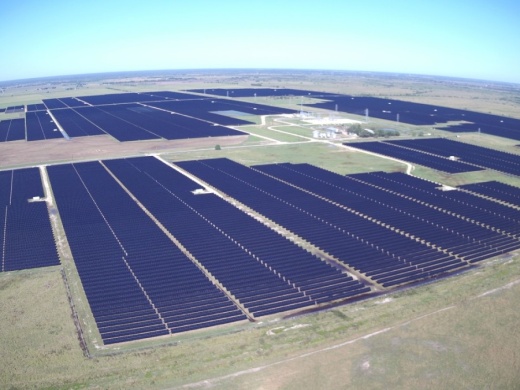“Brazoria County still has a lot of land. We are a large county,” County Judge Matt Sebesta said.
There are six solar projects expanding into Brazoria County. Two belong to Cypress Creek, which chose Brazoria County for two of its solar farms: Wagyu and Longbow, located near Damon and Liverpool, respectively. Both projects sit on land once used for agriculture, said Nicko Keene, the associate development director for Cypress Creek.
“Almost all of the land we lease or purchase in Texas was in agriculture,” Keene said. “We can buy or sell land for a lot more than [the owners] are making on it.”
Wagyu is the first finished solar project in the county, with more on the way. The project became operational in early November. The solar farms in Brazoria County will be able to power homes and businesses inside of the county and the Houston area, along with traditional electricity.
“We are going to need to look at other sources [of power]. With growth in the Houston area, there are bigger demands for electricity,” said Gary Basinger, the president and chief operating officer of the Economic Development Alliance for Brazoria County.
Plans for industry growth
After years of hearing about solar energy becoming more popular, Basinger did not believe solar energy would be effective in Brazoria County. Suddenly, several solar farms seemed to appear in the county at the same time, he said.
“Over the years, ... people have talked about solar, and I said it was too cloudy. I just couldn’t imagine solar being efficient here,” he said.
However, over time, the technology for solar energy has improved, meaning it is effective even on rainy days, he said. In fact, once the panels are taken out of their boxes, they immediately start to generate heat.
Companies such as Houston-based Green Mountain Energy install solar panels on roofs. When the sun shines on them, the panels generate electricity. A home uses the electricity, and if there is more than the house needs, it goes onto the power grid, said Daniel Richmond, the manager of solar and strategic partnerships at Green Mountain Energy. The opposite is true as well: If a home needs more electricity than is produced, it pulls from the power grid.
Not only do panels last for 25-30 years, Richmond said, but solar energy is also better for the environment because it is 100% renewable and uses very little water. Because of this, Green Mountain Energy gives credit to homeowners who opt for solar energy, Richmond said.
“We want people to go solar. The environmental benefits for it are so large. Any power that you send back to us, we give you credit for it at the same rate,” he said.
The Greater Houston area is becoming more popular for solar energy, said Hanna Mitchell, the Texas program director at Solar United Neighbors.
Solar United Neighbors is a nonprofit working to help interested residents in the same region form a solar co-op, bringing down the cost of installing solar energy in their homes.
Solar United Neighbors was founded in 2011 and came to Texas in 2018. Houston has become the most popular market for using solar energy in Texas, Mitchell said.
“When people see it on their neighbor’s roof and ... more normalized, we see more people thinking of getting solar themselves,” Mitchell said.
As solar energy is becoming more popular, it is also becoming more cost efficient for residents, Richmond said.
”What’s going on in the last couple of years is the cost of solar has gone down by at least half,” Richmond said.
The same may be true for businesses as well. Once more solar farms are up and running, more businesses may opt to have solar energy power their company, Sebesta said.
“Any company is going to get the best deal they can for power,” Sebesta said. “They are going to look at their bottom line, and if it is cost effective, they will utilize it.”
While Houston is considered the energy capital of the world, its history in oil, fossil fuels and petroleum does not have to be at odds with solar energy, Mitchell said.
“Houston prides itself in being the energy capital of the world, and I think that it can be an all-of-the-above energy capital of the world,” Mitchell said.
Solar companies buy land
Brazoria County is housing more solar farms, which will offer power to the county. One farm includes Texas Gulf Solar 1 LLC, which is still in the development phase, said Kevin Wetzel, the business development director for Pattern Energy, the farm’s parent company.
While some farms will provide solar energy to specific businesses and residences, Texas Gulf Solar 1 will provide power for the grid, which companies can purchase and sell to residents and businesses, Wetzel said in an email.
Having solar power go into a large power grid could help power different energy sources, including petrochemical power plants, Basinger said.
Cypress Creek’s solar farm, Wagyu, provides a large portion of its energy to BP. Another large portion goes to Starbucks locations across Texas, rather than residents, Keene said.
“There is a big increase in businesses looking for solar energy,” Keene said. “It’s more sustainable ... but it’s also the cheapest way for them to buy electricity.”
Cypress Creek officials knew they wanted to expand to the Houston area and were attracted to Brazoria County because of its land and business-friendly nature, Keene said. Pattern Energy also chose Brazoria County for the same reason, Wetzel said in an email.
“The county judge and Commissioners Court wanted a development of this nature to come to the county. We have increased tax revenue that the county and the school districts will receive,” Keene said.
While farms may power businesses and homes outside of the county, there is the potential for solar energy to one day power more homes and businesses in the county as well, especially as it continues to grow.
“One thing about Brazoria County is that we have a good number of rooftops, with more rooftops coming,” Sebesta said.





